Introduction: The Consciousness Beyond Matter and The Col Lapse of Mechanism
Before the spread of materialist philosophy, the scientific world accepted the fact that Allah had created the universe and everything in it from nothing and kept it under His might at all moments. Materialism, however, first denied Allah's eternal dominion over nature. The view known as mechanism advanced the proposition that all the systems in nature and the universe functioned like machinery, in a self-contained manner. One of the foremost 18th-century representatives of this thesis was the Frenchman Pierre Simon de Laplace, who explained the motion of the Solar System by using the laws of gravity. And in a reply to Napoleon, who questioned his theory, he fell into a serious error by denying that the functioning of the universe was under the control of Allah.
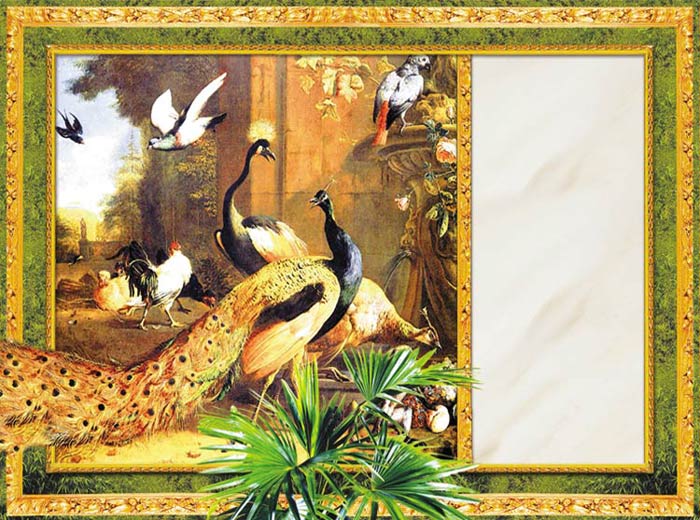 |
| He is the Knower of the Unseen, Whom not even the weight of the smallest particle eludes, either in the heavens or in the Earth; nor is there anything smaller or larger than that which is not in a Clear Book. |
In the 19th century, these errors grew still further: the falsehood was propagated claiming that not only the functioning of the universe could be explained solely in terms of natural laws, but so could the origins of living things. In other words, in the same way that Allah's dominion over nature and the universe was denied, so was His original Creation. The forerunner of this rejection was Charles Darwin, who maintained that living things were the product of natural laws and coincidence. In the 19th century, the "eternal universe" model dominated, maintaining that the universe had existed for ever and functioned solely by means of natural laws and coincidence. By the 20th century, materialists imagined that they had accounted for everything in terms of their own theories.
|
|  |
| (People with intelligence are) those who remember Allah, standing, sitting and lying on their sides, and reflect on the creation of the heavens and the Earth: "Our Lord, You have not created this for nothing. Glory be to You! So safeguard us from the punishment of the Fire." |
However, the 20th century unfolded in a way they never expected. A string of scientific discoveries in the fields of both astrophysics and biology proved that the Universe and living things had been created. The hypotheses of Darwinism collapsed, one after the other. The Big Bang theory showed that the universe had been created from nothing. New findings showed the great creativity and fine tuning in the material world, again revealing claims of materialism to be groundless.
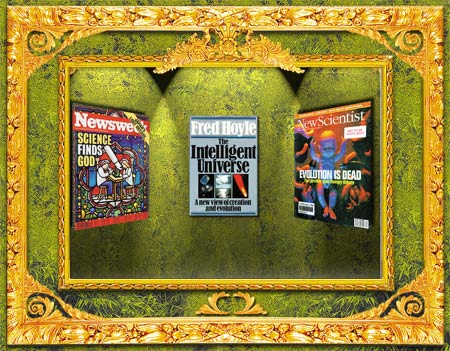 |
| The invalidity of materialism and its so-called scientific basis, Darwinism, has now been scientifically demonstrated. The titles of books and articles reflect the fact that Allah created the universe: Fred Hoyle's The Intelligent Universe; "Science Finds God" in Newsweek; "Evolution is Dead" in New Scientist. |
Over the last years, these two important issues—the scientific collapse of Darwinism and the Creation of the universe from nothing and its fine tuning—have been raised by a great many scientists and scientific writers. In the 1970s, physicists and astronomers raised the Anthropic Principle, which showed that the universe was not a mass of coincidences but on the contrary, reveals an extraordinary Creation and arrangement ideally suited to human life in its every detail. We have already examined these subjects in detail in our previous works. (See Harun Yahya The Creation of the Universe, and The Chain of Miracles.)
All these books concern the origin of the universe and living things and refute Darwinism or the "eternal universe" view that prevailed in the 19th century. The refutation of the materialist view of the functioning of the universe and living things, that is to say of "mechanism," has not yet been revealed in such detail, however.
In fact, scientific findings make this rejection both possible and necessary. It is impossible for the materialist logic, to account not only for the origin of the universe and living things, but also for their functioning.
What Molecular Biology Reveals
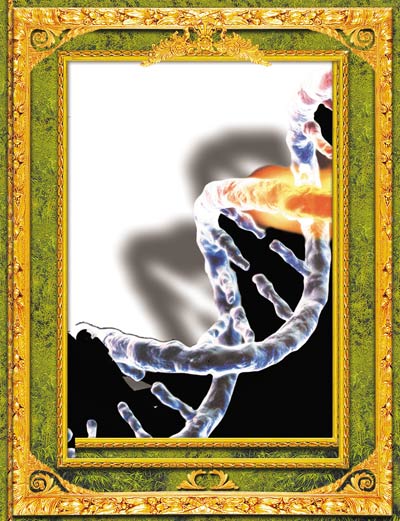
|
| The complex structure of DNA, with the vital and high capacity of information it contains, represents an insuperable difficulty for accounting for the origins of life in terms of coincidence. |
From molecular biology came the greatest impact to the evolution theory in the 20th century. According to the scientists, the cell, the fundamental unit of life, was full of irreducibly complex molecular machines. It was impossible to account for the origin of these machines in terms of Darwinism's blind mechanisms, that is natural selection and mutation.
Today, the known fact that molecular biology has invalidated the claims of Darwinism has been stated in a wide-ranging manner by many biologists who question the theory. One point that frequently escapes notice, however, is that coincidence and natural laws cannot explain not only the origins of the molecular machinery and other extraordinary entities within the cell, but also the way these structures function.
To clarify this with an example, consider DNA, the cell's data bank. DNA is a long molecular chain in the form of a spiral staircase, present in every cell. All the data regarding that cell's physical and chemical structure—as well as the entire organism to which the cell belongs—are encoded along that chain. On its own, however, the presence of such a data bank inside the cell has no significance. The use of that data bank is also of the greatest importance. In other words, the data it contains must be read in the correct manner and actions taken according to the information obtained.
Some of the molecular machines in the cell charged with this task are known as enzymes. These find the necessary information for the production of proteins that the long DNA chain requires, and then open up the DNA, in order to read it. They produce a copy of the information in the appropriate region of the DNA and meanwhile, twist the DNA in order to skip past unnecessary sections. When this reading has been completed, they fold the DNA up again and return it to its original form. They perform all these extraordinary processes at the astonishing speed of 1/1,000th of a second. Every cell in your body produces an average of 2,000 new proteins every second.1
These functions carried out by enzymes—of which DNA replication is only one of very many—are truly astonishing. But most molecular biologists have become accustomed to not being astonished. Therefore, if you ask them how enzymes manage to accomplish such complex tasks, in all likelihood they will reply, "chemical reactions and physical effects within the cell require these." According to this claim, in the same way that it is natural for sodium and chloride to combine to make sodium chloride, or salt when brought together, so the tasks performed by enzymes also consist of similar chemical reactions.
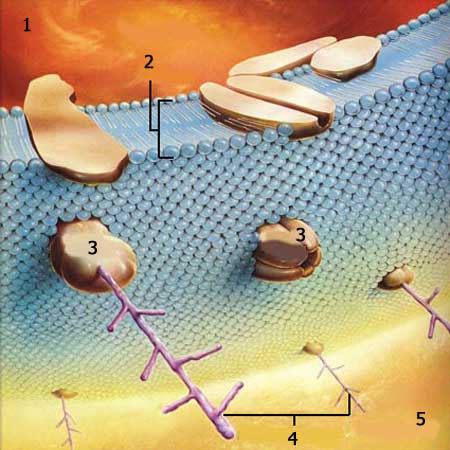 | 1. The Inside of the Cell |
| The molecules in the cell membrane have never received any training in chemistry, biology or physics, yet they can recognize the molecular structures of potassium, sodium, glucose, and water. On that basis, they decide which substance will be admitted or removed, and in what quantities. If any substance were selected at random for entry and removal, then it would be impossible for your body to survive in good health until the cell membrane had stumbled on the right molecule. Yet the cell membrane acts under the inspiration of Allah Who created them, and carry out their duties to perfection. |
Yet their reply would be erroneous, because an important part of the processes inside the cell consists of flawless actions that do not stem from chemical or physical effects. Some of the best examples of that appear not in the cell nucleus, but in the membrane, the subject of this book. The cell membrane seems to know what is needed inside the cell and either admits or rejects outside substances in accordance with those requirements.
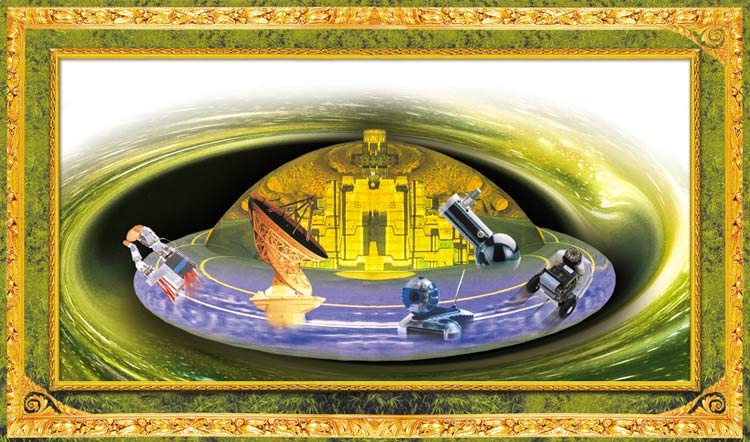 |
| Entry to and departure from the cell take place under highly sensitive supervision. The passage of a substance through the cell membrane is regulated with the greatest care, according to its type, whether it is useful or harmful, and its size. This selective permeability of the cell membrane leaves scientists astonished. |
One of those realizing the extraordinary nature of this is the Israeli biophysicist Gerald Schroeder, trained in physics at the Massachusetts Institute of Technology (MIT), studied biology for many years, published papers in a great many scientific journals and played a role in nuclear research. As he writes,
The entrance to a living cell is marked by passage through a membrane functioning to keep the bad stuff out, while letting the good stuff in, and expelling what needs to be expelled, waste products and manufactured goods. But who or what decides what comes in and what goes out?
A myriad of portals provide entry, but only if signaled to open and allow entrance. Some of these ports are gated or opened by subtle changes in voltage differences across the membrane. Others open when a molecular key comes and unlocks them, allowing another molecule to pass. The cues come from within the cell, if it's a call from the building blocks needed in protein replication, and from outside if, for example it's a nerve cell coaxing a neighboring cell into action. A vast number of assumptions are woven into the simple act of signaling a membrane port to open. But where did they get their smarts? Since when do carbon, nitrogen, oxygen, hydrogen, sulfur, phosphorus—the primary building blocks of biology—have ideas of their own, or any ideas at all? They're just atoms strung together to make molecules. Where'd they get the chutzpah to become keepers of the gate?2
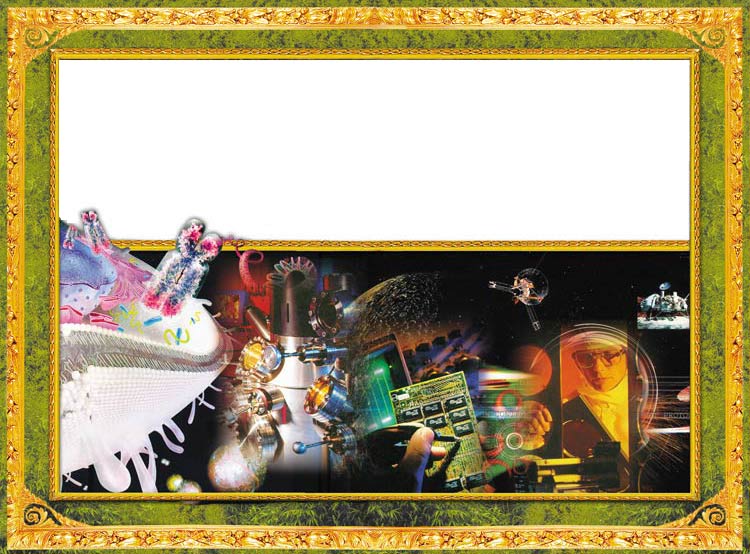 |
| Darwinists claim that the cell could have formed spontaneously as a result of coincidence. But the structure of the cell is so complex that scientists cannot reproduce any cell-like structure, even with all their advanced technology. Contrary to their preconceptions, their studies actually reveal that the cell was created. |
After touching on these important matters, Schroeder describes the error of the materialist education he received.
Membrane design is absolutely brilliant. I've been taught that nature did it all. But there is a catch to this logic of a laissez-faire nature. In the presence of water, they [lipids and phospholipids that make up the cell membrane] do align to form sheets and even spheres. But a leap in information separates a sphere from a cell. That information is the plan of proteins and other molecules required to produce the portals that allow controlled transport across the membrane. 3
As you see, Schroeder believes the logic of self-contained nature, which has dominated the scientific world since the 18th century, to be mistaken. He also maintains that the claim that the cell membrane functions solely as a result of natural laws—which is an absolute dogma of materialist science—is incorrect.
Schroeder's explanation is that the molecules that constitute life behave in a flawless manner:
Every particle, every being, from atom to human, appears to have within it a level of information, of conscious wisdom ... The puzzle I confront in this book is this: where does this arise? There is no hint of it in the laws of nature that govern the interaction among the basic particles that compose all matter. 4
One important distinction is that although intelligence is observed in matter, it is impossible for that intelligence to stem from matter itself. You can see this most clearly by comparing animate and inanimate substances. While intelligence is openly displayed in living matter—in a cell, for instance—there is no such intelligence in inanimate matter. Yet both proteins that constitute the cell and the same molecules that constitute the stones along the road consist of the same kinds of atoms, assembled together. Their materials are fundamentally the same. Yet while we observe no intelligent action in the molecules in the stone, astonishing intelligence can be seen in those of the cell. (In addition, inanimate substances in nature have never been observed to develop into living organisms, although this is the basic claim of the theory of evolution.)
Gerald Schroeder draws attention to this and emphasizes how intelligence appears in the molecules in organisms:
The chemistry of a biological cell is the same as the chemistry that forms sodium chloride. One set of rules for all. But unlike sodium chloride, which follows the rules by rote, life has somehow gotten hold of wisdom, of information, that thought it to take energy from its environment, to concentrate that energy, and with it to build and maintain the meaningful complexity of the biological cell ... What enabled these complex arrangements of carbon plus a few other elements to become so clever remains an enigma.5
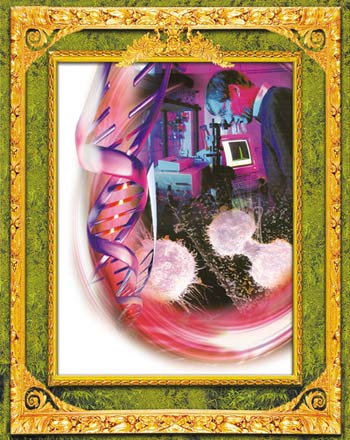 | 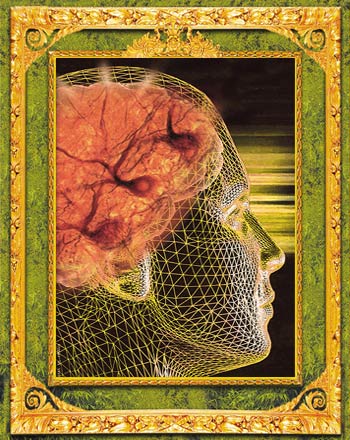 |
| Darwinists claim that the cell could have formed spontaneously as a result of coincidence. But the structure of the cell is so complex that scientists cannot reproduce any cell-like structure, even with all their advanced technology. Contrary to their preconceptions, their studies actually reveal that the cell was created. | The consciousness evident in the material world is not an innate property of matter, but one manifested through it. The consciousness in the brain that interpret the signals reaching it does not belong to the brain's cells themselves. The intellect and consciousness they manifest reveal another of the countless proofs of the existence of Allah. |
In fact, there is no secret here, only a certain truth. The intelligence that appears throughout the material world is not a property belonging to matter itself, but one exhibited in it. It shows evidence of Allah's existence in a scientific way. The molecules that constitute our bodies stage unexpected displays of intelligence through the inspiration of Allah and actually once again reveal the infinite Wisdom of Almighty Allah, their Creator.
Allah created the entire universe from nothing and maintains the universe He has created, and all the living and non-living things in it, under His control.
In the Qur'an, which our Lord has sent down to us as a guide, Allah reveals that He enfolds all things with His infinite knowledge:
"It is Allah Who created the seven heavens and of the Earth the same number, the Command descending down through all of them, so that you might know that Allah has power over all things and that Allah encompasses all things in His knowledge." (Surah Talaq , 12)
". . . There is no creature He does not hold by the forelock ... " (Surah Hud, 56)
The Knowledge That Enfolds the Universe Is That of Allah
Following a great many endeavors, the scientific world that embarked with mechanist and other materialist conceptions in the 18th and 19th centuries has now faced the fact that the universe and living things were created and are maintained under control at every moment—some proofs of which we shall examine in this book.
The entire universe consists of proofs of Allah's infinite knowledge. The more science investigates nature in detail, the more reflections of that knowledge are revealed. All efforts over the last two centuries to reduce the source of that information to matter alone (in other words, to portray matter as a product or attribute of itself) have proved fruitless. It has emerged that all materialists—Darwin, Laplace, Freud and Engels—were mistaken.
This book shall examine events taking place in the cell, which are more complex, planned and rational than could possibly have been imagined 40 or 50 years ago. None of the molecules we shall be discussing possesses a mind with which to plan and carry out the rational actions it performs. An incomparable intelligence is exhibited in these molecules, although the source of that intelligence does not belong to matter itself. That same superior intellect appears in the extraordinarily sensitive balances that formed in the aftermath of the Big Bang, in the nuclear reactions inside giant stars, or in the structures of the elements that are ideally suited to life. As Schroeder puts it, "a single Consciousness, an All-Encompassing Wisdom, pervades the universe." 6
That consciousness pervading the universe is the infinite knowledge and mind of Allah. As Allah reveals in one verse of the Qur'an:
"Your god is Allah alone, there is no god but Him. He encompasses all things in His knowledge." (Surah Ta ha, 98)
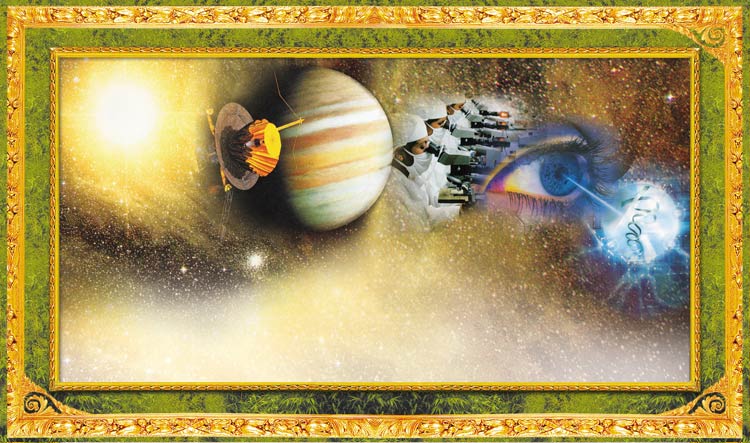 |
| Every detail in the universe is part of an ordered plan. Whether you examine the universe by means of giant telescopes, or the complex activities in the cell under an electron microscope, you see the same flawlessness, order and harmony prevailing. All details, especially and consciously created, clearly reveal the existence of Allah and the infinite knowledge of our Lord. |
Footnotes
1. Gerald L. Schroeder, How Science Reveals the Ultimate Truth, New York: The Free Press, 2001.
2. Ibid., p. 62.[emphasis added]
3. Ibid., p. 64. .[emphasis added]
4. Ibid. Front matter.
5. Ibid., p. 59.
6. Ibid., p. 146.
- Foreword
- Introduction: The Consciousness Beyond Matter and The Col Lapse of Mechanism
- The Miniature Factories Comprising Our Bodies: The Cells
- The Cell's Complex Structure Can not Be Explained in Terms of Coincidence
- Superior Creation in The Structure of The Cell Membrane
- Complex Transportation Systems in The Cell Membrane
- The Selective Permeability of The Protein Channels in The Cell Membrane
- Selectivity in Nerve Cells
- Signal Selection in Traffic of Data Among Cells
- Selection in The Immune System's Cells
- Vital Selections in The Blood
- The Importance of The Creation in The Cell Membrane in Terms of Multi-Cellularity
- The Delicate Balance in Substances Selected in The Body
- The Cell Membrane Invalidates Claims of The Theory of Evolution
- Conclusion: Allah Pervades Everywhere With His Wisdom
